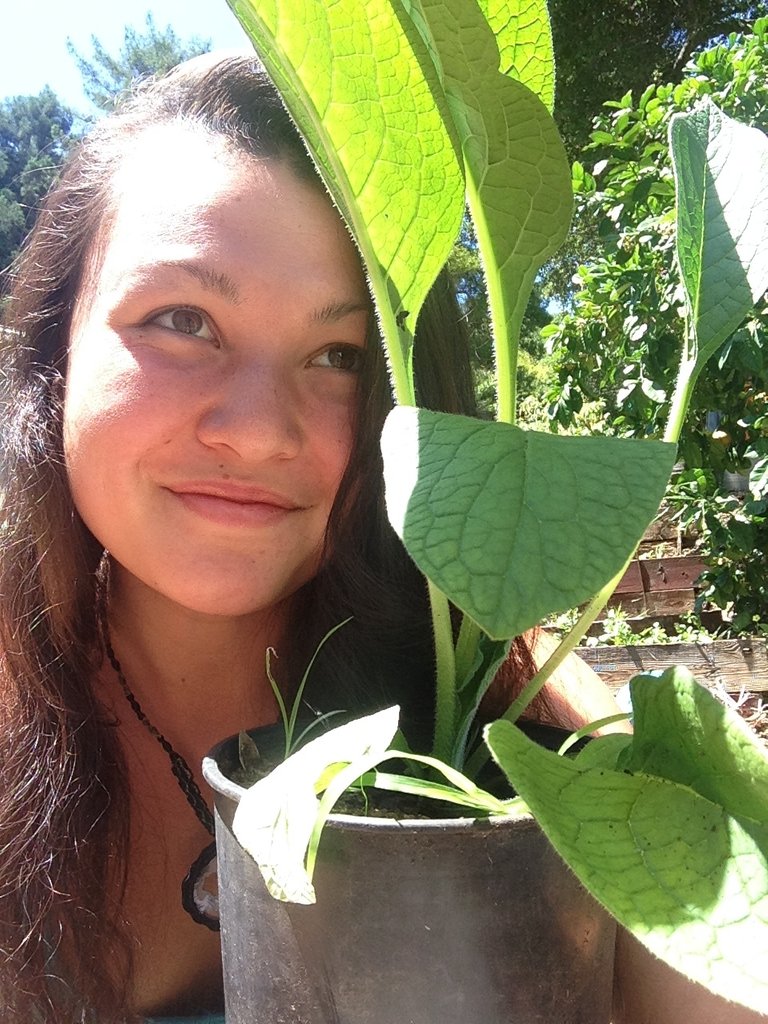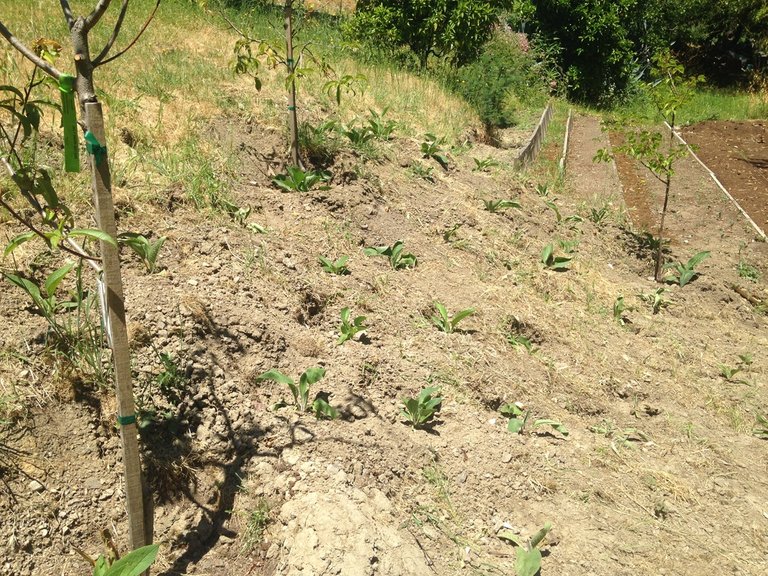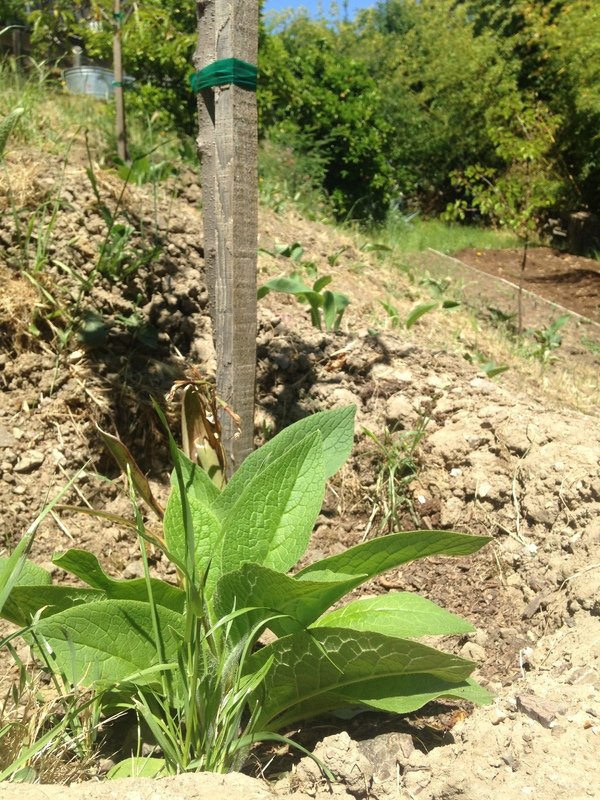
Hi everyone! Today I want to do a spotlight on my favorite plant, comfrey. I first learned about comfrey on the farm that I WWOOFed on in New Zealand. We would add comfrey leaves to big barrel full of horse manure, fill the barrel with water, and in a few weeks we would use that compost tea to fertilize the lime fields. Over the years I've learned more and more about how diverse and abundant comfrey can be in a permaculture farm. A few months ago I ordered 70 root cuttings of comfrey from Coe's Comfrey and CHANGE Farm, put each cutting in a pot of soil, covered each cutting with 2 inches of soil, and watered them every other day. Now, I have 70 beautiful and large comfrey plants. Last week some friends came over for a garden potluck and we planted about 40 of these plants on our hillside. It was a beautiful day and I am so excited that these comfrey babies are in the ground and growing!

How to grow
- Soil - best in moist, fertile soils, but will grow in most soils
- Climate - best in full sun and cooler environments, and is frost and drought tolerant
- Propagation - most comfrey is grown from root cuttings and crown divisions, which can be bought from comfrey growers online and in some nurseries
- When to plant - best to plant root cuttings or crown divisions in the spring, but can be planted as late as October
- Spacing - 3-4 feet apart depending on desired density
- Lifespan - perennial plant that can live longer than 20 years if well cared for
- General care - keep the space around comfrey well weeded, harvest comfrey regularly for continued leaf growth, and fertilize with organic compost annually

Benefits (there are so many!!!)
- Adding comfrey leaves to a compost pile will "activate" the compost pile and speed up the process
- Comfrey leaves have a high protein content (as high as legumes), and can be used as food for farm animals (my chickens are eating wilted comfrey leaves that I harvest for them)
- Comfrey has an allantoin content (a cell proliferant and skin strengthener) in its roots and leaves that have been used for centuries in folk medicine for healing wounds, sores, burns, swollen tissue, and broken bones (its nickname is "knit bone" plant)
- Comfrey is a dynamic accumulator because it has roots that can be 8-10 feet deep and will draw up minerals and nutrients that are inaccessible for many other shallow-rooted plants; comfrey leaves can then be brewed to make a compost tea that is high in these minerals and nutrients to then be fed to other plants
- Other medicinal properties include being a demulcent, astringent, pectoral, vulnerary, mucilaginous, styptic, and nutritive

Recipe
I have been making comfrey compost tea for a while, and it has helped my plants grow like crazy! Note, this compost tea is not for human consumption ;-)
- Harvest comfrey leaves with scissors or a knife and chop or rip up the leaves into smaller pieces
- Get a 5 gallon bucket and fill the bucket halfway with comfrey leaves
- Fill up the bucket with water
- Add a brick on top of the comfrey leaves so they stay submerged under water
- Cover the bucket
- Allow the comfrey to soak in the covered bucket for at least 3 weeks in a space out of the sun and not too close to human noses (it's stinky!)
- After 3 weeks, strain out the leaves and dilute the compost tea with 6-10 parts water to every part compost tea (depending on how strong you want your compost tea)
- Apply the diluted compost tea to your plants at the base
- Your plants will thank you for all of the nitrogen, phosphorus, potassium, silicon, calcium, iron, iodine, and other minerals that you are feeding them!

Fun Facts
- There is controversial research about the pyrrolizidine alkaloids in comfrey being carcinogenic and damaging to the liver, therefore there is a ban in the US on orally ingested comfrey products
- The alkaloid is not found in the dried herb, therefore comfrey tea is still drunk by many
- Comfrey creams and ointments applied topically are safe to use
- Comfrey is so effective in aiding new cell growth that it should not be used on deeper cuts until these cuts have started their own self-healing process because the use of comfrey on deep cuts causes excessive cell growth inside the cut which leads to a raised scar
- Comfrey is the only land plant that we know of that sources and stores Vitamin B-12 from the soil
Sources
https://www.hort.purdue.edu/newcrop/afcm/comfrey.html
http://www.coescomfrey.com/
The New American Herbal by Stephen Orr

In the photo, a wild-growing comfrey on the edge of the forest is with us.
Very inspiring to see how much love someone can offer to nature. Keep it up.
Followed and upvoted!
Thanks @theospay!
Amazing @grildrig! Are the wild-growing comfrey used at all in medicine making or teas?
Yes, it is. And in folk medicine. But this plant has a great potential in the future.
I think what you are doing is so cool and awesome! I look forward to checking out more of your posts.
Homesteading has been on my bucketlist for awhule now.
Permaculture has only entered my radar within the last 2 years.
This stuff is cool. Thanks for sharing the awesomeness.
Oh and...whooofing ... its been an idea of been flirting with a bit for near as way to really subatantiate my education and practical skill set. Awesomess all around.
Tag, You're it! Awesome :)
Steem On, the dream is Live.
Lets See what we can steem Up!
:)
Thanks so much @worldclassplayer!
I'd definitely recommend WWOOFing, I loved my experience on several farms and learned so much hands on that I could never learn from a book, including lessons in community building :-)
So Awesome!
I look forward to tuning in from time to time. You're a Teacher that I see I can learn a lot from.
Thanks so Much for being so Cool.
:)
Steem On, The Dream is Live
:)
Almost forgot to say:
Community Building is so Awesome!
Steem on Sista!
Ooooh! That's so cool about the compost piles Anwen. I just redid my father's non very well functioning piles this month.
He lives in Montana, East of the divide where it's quite dry, and he was using chicken wire silos that weren't very large because he heard they needed heat and air. Only it's so dry here, they barely did anything, mostly just dried up.
I built a larger wooden slated 3 sided box, about 6 feet by 4 feet, and piled everything in there with a bunch of chicken manure. I've got him watering it on a regular basis and we throw a couple pieces of plywood over the top to loosely keep the sun off.
It's working great! When i thrust my arm down in there the other day it was too hot to keep my hand in!!
I'm pretty happy about it. Thanks for your post. I'm excited you're posting about it this stuff! My gf is into plants and Permaculture too, I'm trying to get her on here =)
That's awesome @itchykitten! It sounds like you knew exactly what those compost piles needed to get kickstarted again :-) I have a similar set up with my compost bins that I made out of recycled wood. I just made a pile two days ago and it's already at 150F! I hope your gf joins Steemit, I'd love to see some more posts about permaculture and farming.
upvote and resteem for u...
Thanks @lautenglye!
u r welcome...
Great informative post. Thanks @anwenbaumeister. Fascinating that it is the only plant that has vitamin B12. Very handy to have the compost tea recipes. Saving this post for future reference to make fertilizer for our garden.
Thanks so much @suzique! Yes, I recently discovered the vitamin B12 fact and found that really interesting as well. I hope the compost tea making goes well!
great post! thanks for sharing... maybe i need to get some growing in my garden, too.
The B12 fact really got me interested. Do you have any suggestions on how to integrate comfrey into the diet?
Thanks @fraenk! I'd definitely recommend growing comfrey in almost any garden (and there are very few plants I'd say that about). Well, some people eat comfrey or make comfrey tea, however as I wrote in my post "There is controversial research about the pyrrolizidine alkaloids in comfrey being carcinogenic and damaging to the liver, therefore there is a ban in the US on orally ingested comfrey products", so I'd definitely do more research about that. It seems as though the alkaloid is not present in dried comfrey, so perhaps by drying the comfrey and using it in tea? I'd trust your own research and body though!
Thanks for the extensive answer @anwenbaumeister.
I'll make sure to make some of my own research before considering it in my diet. But the compost tea idea alone has convinced me to grow some... just got to get my hands on it.
I had three comfrey plants which I split after they started making small plants ending up with 6 plants. In the end, 5 died. Luckily I still got one left whose leaves got destroyed by the birds from time-to-time.
But I agree with you that comfrey is one of those "wonder" herbs which is a must in the garden :)
Oh no! That's a bummer. Do you know why they died?
I haven't started splitting mine yet, but fingers crossed they will survive their transplanting for next year!
Great post about a wonderful plant! I love comfrey - it's easy to grow and has so many uses. The flowers are cute, too! :)
Hey @runaway-psyche! I love comfrey too :-) Whenever my friends ask me what it is, the first thing I say is "it's magic!" ;-)
Permaculture is such a cool thing. Being around a garden with all those living plants always make you feel so good :)
<3
Thanks @acromott! It does make me feel wonderful! I think I'm the happiest form of myself when I am in direct contact with soil and plants :-)
This plant goes pretty wild here in Canada. Alot of people call it a weed and try to eradicate it from their land. I love it and it's medicinal uses. Thanks for the recipe for my Garden.
Thanks for sharing! Well written and informative